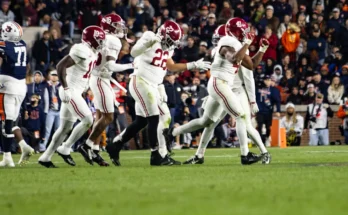Clemson’s Ascendancy: How ‘Everybody Loves Clemson’ Reflects a Program’s Unyielding Commitment to Excellence
In the realm of college football, few programs have experienced the meteoric rise to prominence that Clemson University has achieved in recent years. The phrase “Everybody loves Clemson” encapsulates not just the team’s success on the field but also the culture, leadership, and community that have propelled the Tigers to national recognition. This transformation is a testament to the unwavering commitment of its coaching staff, particularly head coach Dabo Swinney, and the collective effort of players, alumni, and fans.(
Clemson’s ascent began in earnest in the early 2010s. Under Swinney’s leadership, the program shifted from being a regional powerhouse to a national contender. The 2015 season marked a pivotal moment when the Tigers secured a spot in the College Football Playoff National Championship, signaling their arrival on the national stage. This achievement was not an isolated incident but the beginning of a sustained period of excellence.
In 2016, Clemson clinched its first national title in over three decades, defeating Alabama in a thrilling championship game. This victory solidified the program’s status among the elite in college football. The following years saw the Tigers consistently competing for and winning ACC titles, further establishing their dominance in the sport.
The phrase “Everybody loves Clemson” gained traction as the team’s success became more widespread. It reflects the growing admiration for the program’s achievements and the positive narrative surrounding the team. However, this popularity also brought heightened expectations and increased scrutiny.
Defensive coordinator Brent Venables addressed this shift in perception, emphasizing the importance of maintaining focus and consistency despite external praise. He noted that the coaching staff’s approach remained unchanged, focusing on preparation and execution rather than the accolades. This mindset has been crucial in navigating the pressures that come with success.
Central to Clemson’s rise is the leadership of Dabo Swinney. His philosophy centers on building a program rooted in integrity, hard work, and a commitment to excellence. Swinney’s approach has fostered a culture where players are held accountable and are expected to perform at their best both on and off the field.
This culture is evident in the team’s performance and the development of players who often exceed expectations. Notable examples include quarterback Deshaun Watson, who led the team to a national championship, and wide receiver Hunter Renfrow, a former walk-on who became a key contributor in pivotal games.
A significant factor in Clemson’s sustained success is its approach to recruiting and player development. The program has consistently attracted top talent, blending highly rated recruits with under-the-radar prospects who develop into stars. This strategy ensures depth and competition within the team, driving continuous improvement.
Recruiting analyst Paul Strelow has highlighted the importance of this balanced approach, noting that Clemson’s success is not solely due to landing five-star recruits but also to its ability to develop players and maintain a cohesive team culture.
Beyond the field, Clemson’s success is intertwined with the support of its community and fan base. The university’s culture emphasizes unity and pride, creating an environment where both players and supporters are invested in the program’s success. This strong community connection has been instrumental in building a lasting legacy.
Events like the annual spring game and fan days allow supporters to engage with the team, fostering a sense of belonging and shared purpose. This engagement extends to alumni, who continue to support the program through donations and mentorship opportunities for current players.
Despite its success, Clemson has faced challenges that have tested its resilience. The program has had to navigate periods of intense competition, injuries, and the evolving landscape of college football. However, the foundation built by Swinney and his staff has enabled the team to persevere and continue its upward trajectory.
The ability to adapt to changes, such as the introduction of the transfer portal and name, image, and likeness (NIL) legislation, has been crucial. Clemson’s proactive approach to these changes demonstrates its commitment to staying at the forefront of college football.
As Clemson moves forward, the challenge will be to maintain its high standards and continue to evolve in a rapidly changing environment. The program’s success has set a benchmark for excellence, and the expectations will only continue to grow. However, with the leadership in place and the strong foundation established, the future remains bright for Clemson football.
In conclusion, the phrase “Everybody loves Clemson” is more than a reflection of the team’s popularity; it signifies the culmination of years of hard work, strategic planning, and a commitment to excellence. Clemson’s journey from a respected program to a national powerhouse is a model for success in college football. As the Tigers continue to build on their legacy, they inspire future generations to strive for greatness both on and off the field.



